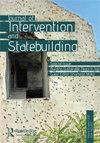“地方”和“国家”之间的新平衡?利比亚安全部门改革失败
IF 2.3
2区 社会学
Q1 INTERNATIONAL RELATIONS
引用次数: 0
摘要
摘要本研究认为,安全部门改革(SSR)的地方所有权努力可能不足以为冲突后国家带来稳定,特别是在国家因武装冲突而崩溃的情况下。基于纵向一体化方法,该研究对地方和国家安全提供者/倡议进行了概念上的区分,并强调了国际行动者为在冲突后重建期间实现安全与稳定而应在两者之间发挥的建立平衡作用的重要性。该研究将2011年至2014年的利比亚经验作为单一案例研究,主要依赖于联合国文件和基于实地工作的报告。关键词:安全部门改革利比亚地方所有权垂直整合冲突后重建披露声明作者未报告潜在的利益冲突。本研究得到了土耳其科学技术研究委员会(TÜBİTAK)的资助[编号1059B192000778]。作者简介nuri ye本文章由计算机程序翻译,如有差异,请以英文原文为准。
A new balance between ‘Local' and ‘National'? Libya's Failed Security Sector Reform
ABSTRACTThis study argues that local ownership of Security Sector Reform (SSR) efforts may not be enough to bring stability to post-conflict countries, especially where the state is collapsed due to armed conflict. Based on the vertical integration approach, the study makes a conceptual distinction between local and national security providers/initiatives and highlights the importance of the balance-building role that international actors should play between them to achieve security and stability during post-conflict reconstruction. The research focuses on the Libyan experience between 2011 and 2014 as a single case study and relies mainly on United Nations (UN) documents and fieldwork-based reports.KEYWORDS: Security sector reformLibyalocal ownershipvertical integrationpost-conflict reconstruction Disclosure statementNo potential conflict of interest was reported by the author(s).Additional informationFundingThis work was supported by Turkish Scientific and Technological Research Council (TÜBİTAK) under Grant [number 1059B192000778].Notes on contributorsNuri YeşilyurtNuri Yeşilyurt is an associate professor of International Relations at the Faculty of Political Science, Ankara University (Turkey). He was a visiting researcher at the School of Politics and International Relations, University of Kent (UK) during 2021-2. He received BA and PhD degrees from Ankara University, and MPhil degree from the University of Cambridge. His publications are mainly focused on Turkish – Arab relations, Turkish Foreign Policy, and MENA politics and security. Dr. Yeşilyurt’s research at the University of Kent was funded by Turkish Scientific and Technological Research Council (TÜBİTAK) and focused on the problem of Security Sector Reform in post-uprising Libya.
求助全文
通过发布文献求助,成功后即可免费获取论文全文。
去求助
来源期刊

Journal of Intervention and Statebuilding
INTERNATIONAL RELATIONS-
CiteScore
5.20
自引率
20.00%
发文量
21
期刊介绍:
The Journal of Intervention and Statebuilding is a cross-disciplinary journal devoted to critical analysis of international intervention, focussing on interactions and practices that shape, influence and transform states and societies. In 21st century political practice, states and other actors increasingly strive to transplant what they see as normatively progressive political orders to other contexts. Accordingly, JISB focuses on the complex interconnections and mutually shaping interactions between donor and recipient communities within military, economic, social, or other interventional contexts, and welcomes perspectives on political life of, and beyond, European state-building processes. The journal brings together academics and practitioners from cross-disciplinary backgrounds, including international relations, political science, political economy, sociology, international law, social anthropology, geography, and regional studies. The editors are particularly interested in specific or comparative in-depth analyses of contemporary or historical interventions and state-building processes that are grounded in careful fieldwork and/or innovative methodologies. Multi or cross-disciplinary contributions and theoretically challenging pieces that broaden the study of intervention and state building to encompass processes of decision-making, or the complex interplay between actors on the ground, are especially encouraged.
 求助内容:
求助内容: 应助结果提醒方式:
应助结果提醒方式:


